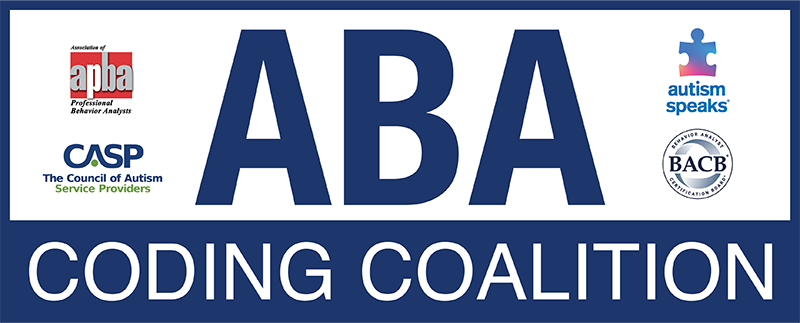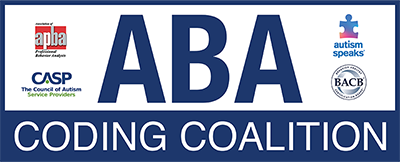MUEs & Payer Implementation
December 19, 2018
If you bill health insurance, please read this message carefully. It contains very important information about implementation of the 2019 CPT® codes for adaptive behavior services.
Medically Unlikely Edits. As we have noted in several webinars, presentations, and Q&A sessions, the Medically Unlikely Edits (MUEs) for adaptive behavior services will change January 1, 2019. That is a result of the conversion to the 2019 Category I and revised Category III CPT® codes. As a reminder, MUEs for a HCPCS or CPT® code are the maximum number of units of service a provider would report under most circumstances for a single beneficiary on a single date of service. MUEs are set by an agency contracted by the Centers for Medicare & Medicaid Services (CMS) after circulating proposed MUEs to medical specialty societies and other stakeholders. The CMS MUE program was developed to reduce the paid claims error rate. It is essential for ABA providers to be well-informed and up to date on applicable MUEs to avoid having claims denied because they exceed existing MUEs.
Please keep in mind that although payers implement MUEs for all medical services, it may be medically necessary to exceed the assigned MUEs for a particular client. In that case, the provider should submit required documentation (e.g., clinical information and supportive literature) to the payer to support their argument that it is medically necessary to exceed the assigned MUE for that client.
The MUEs for the adaptive behavior CPT® codes that will be effective January 1 are outlined below. In early December we contacted the National Correct Coding Initiative (NCCI) to ask them to increase the MUEs for CPT® code 97151 from 8 units (2 hours) to 32 units (8 hours) and for code 0373T from 24 units (6 hours) to 32 units (8 hours). Following a NCCI workgroup meeting last week, we were informed that CMS has accepted our requested increases for Medicaid claims. Although the increased MUEs will not be published until April 2019, CMS has indicated that they will make the increases for Medicaid claims retroactive to January 1, 2019. They will retain the initial MUEs for Medicare claims as published in the January 1, 2019 file. Commercial payers are not required to use the CMS MUEs, but most do.
Providers who wish to appeal denied claims based on MUEs should visit the CMS webpage for guidance. Additional information on MUEs can be found here. Should you encounter any problems due to MUEs, please contact Jenna Minton at mintonhealthcarestrategies@gmail.com.
| Current Procedural Terminology (CPT) codes, descriptions and other data only are copyright 2018 American Medical Association. All rights reserved.
CPT® is a registered trademark of the American Medical Association. Applicable FARSDFARS Restrictions Apply to Government Use. Fee schedules, relative value units, conversion factors and/or related components are not assigned by the AMA, are not part of CPT, and the AMA is not recommending their use. The AMA does not directly or indirectly practice medicine or dispense medical services. The AMA assumes no liability for the data contained or not contained herein. | ||||
| HCPCS/ CPT Code | Practitioner Services MUE Values | MUE Adjudication Indicator | MUE Edits Converted to Hours | MUE Rationale |
|---|---|---|---|---|
| 97151 | 8 Will be increased to 32 units for Medicaid claims | 3 Date of Service Edit: Clinical | 2 hours | Clinical: CMS Workgroup |
| 97152 | 8 | 3 Date of Service Edit: Clinical | 2 hours | Clinical: CMS Workgroup |
| 97153 | 32 | 3 Date of Service Edit: Clinical | 8 hours | Clinical: Society Comment |
| 97154 | 12 | 3 Date of Service Edit: Clinical | 3 hours | Clinical: CMS Workgroup |
| 97155 | 24 | 3 Date of Service Edit: Clinical | 6 hours | Clinical: Society Comment |
| 97156 | 16 | 3 Date of Service Edit: Clinical | 4 hours | Clinical: CMS Workgroup |
| 97157 | 16 | 3 Date of Service Edit: Clinical | 4 hours | Clinical: CMS Workgroup |
| 97158 | 16 | 3 Date of Service Edit: Clinical | 4 hours | Clinical: CMS Workgroup |
| 0362T | 8 | 3 Date of Service Edit: Clinical | 2 hours | Nature of Service/Procedure |
| 0373T | 24 Will be increased to 32 units for Medicaid claims | 3 Date of Service Edit: Clinical | 6 hours | Clinical: Society Comment |
Payer Implementation of the 2019 CPT® Codes. We have been collaborating with experienced coders, billers, and providers to compile information about procedures and timelines for adoption of the CPT®; codes for adaptive behavior services that go into effect January 1, 2019 by payers around the U.S. At this link you can download a spreadsheet summarizing the information we’ve been able to gather to date. As it shows, many large payers are converting to the new codes on January 1, so if you bill them, it is vitally important that you prepare now for those changes. Please be aware, however, that some payers’ plans are still in flux, so the information in the spreadsheet could change at any time. We will do our best to keep you apprised of updates, but it is your responsibility to obtain information directly from each of your payers. If you have questions or information to add to the spreadsheet, please email Jenna Minton at mintonhealthcarestrategies@gmail.com.
Other Resources. If you do not already have them, it is essential that you obtain and study these additional resources on the 2019 CPT® codes:
- The CPT® 2019 Code book, available from the American Medical Association (AMA) Store
- Article in the November 2018 issue of the CPT® Assistant newsletter published by the AMA. To purchase just the November 2018 issue, call 1-800-621-8335, select option 2 in the recorded menu, and ask for item BI506118. The cost is $19.95; $14.95 for AMA members).
- Code conversion table and suggestions for providers that we distributed in October. See our emails about those.
Please also be on the lookout for additional emails and resources that we will be distributing over the coming weeks and months.

